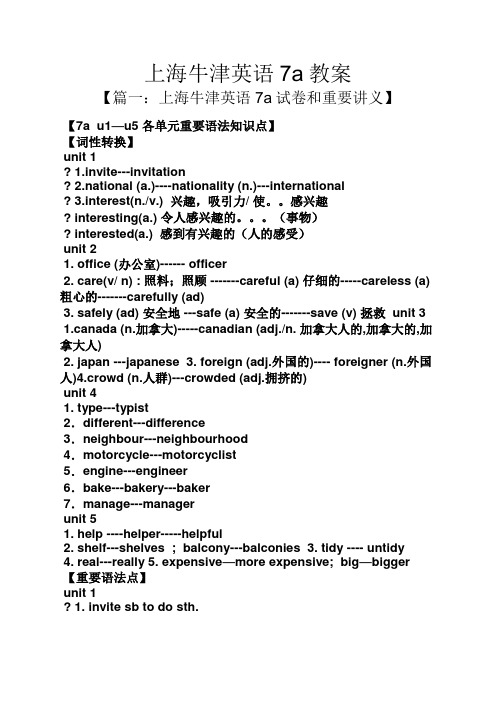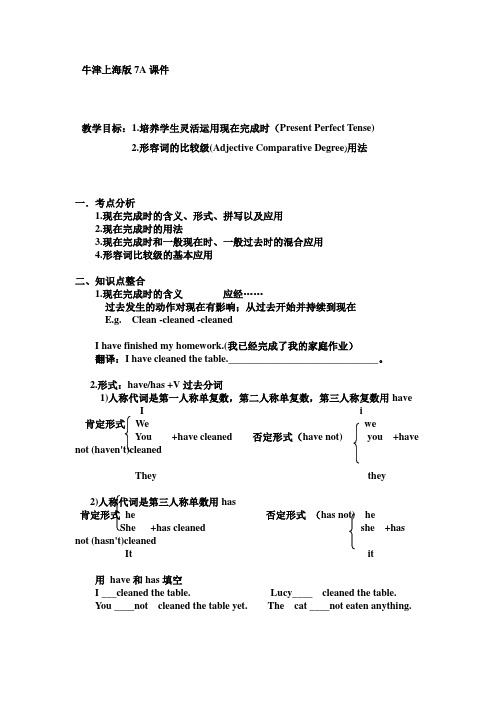牛津上海版英语7A讲解材料
七年级英语7A Unit1-Unit5主要知识点复习上海牛津版知识精讲

七年级英语7A Unit1-Unit5主要知识点复习上海牛津版【本讲教育信息】一、教学内容:7A Unit1-Unit5主要知识点复习二、知识总结与归纳Module 1 (Unit 1- Unit 3)1. invite sb. to do邀请某人做某事He has invited us to stay with his family in Beijing.他已经邀请我们去北京和他的家人呆在一起。
2. travel to 旅行去……We usually travel to some small cities.我们经常去一些小城市旅游。
3. more interesting 更加有趣more beautiful 更加美丽more exciting 更加激动人心4. talk to 和……谈话Let’s talk to Mum and Kitty.让我们去和妈妈还有基蒂谈谈。
5. travel agent 旅行经纪人I’ll get some brochures from the travel agent.我会从旅行经纪人那里拿到一些宣传手册。
6. How long does it take to…? ……花费多少时间?It takes (time) to do ………花费(时间)How long does it take to get to Beijing?到北京花费多少时间?It takes about 2 and a half hours to get there.到北京大概要花费两个半小时。
7. come back 回来We’re going to come back at 8.我们将会在8点回来。
8. at the end of (August) 在(八月)底We will start school at the end of August.我们将会在八月底开学。
9. thank sb. for 为……谢某人Thank you for your water. 谢谢你的水。
上海牛津英语7a教案

上海牛津英语7a教案【篇一:上海牛津英语7a试卷和重要讲义】【7a u1—u5 各单元重要语法知识点】【词性转换】unit 1? 1.invite---invitation? 2.national (a.)----nationality (n.)---international? 3.interest(n./v.) 兴趣,吸引力/ 使。
感兴趣? interesting(a.) 令人感兴趣的。
(事物)? interested(a.) 感到有兴趣的(人的感受)unit 21. office (办公室)------ officer2. care(v/ n) : 照料;照顾 -------careful (a) 仔细的-----careless (a) 粗心的-------carefully (ad)3. safely (ad) 安全地 ---safe (a) 安全的-------save (v) 拯救 unit 3 1.canada (n.加拿大)-----canadian (adj./n. 加拿大人的,加拿大的,加拿大人)2. japan ---japanese3. foreign (adj.外国的)---- foreigner (n.外国人)4.crowd (n.人群)---crowded (adj.拥挤的)unit 41. type---typist2.different---difference3.neighbour---neighbourhood4.motorcycle---motorcyclist5.engine---engineer6.bake---bakery---baker7.manage---managerunit 51. help ----helper-----helpful2. shelf---shelves ; balcony---balconies3. tidy ---- untidy4. real---really5. expensive—more expensive; big—bigger 【重要语法点】unit 1? 1. invite sb to do sth.? 2. talk to/ with sb. ? 4. talk about sth. (talk to sb about sth) ? 3. on+具体几月几日,on aug.16/ on 16 august 注意读音 ? 4. thank you for+ n.----thank you for your help. thank youfor+ doing---- thank you for writing to me. ? 5. more than = over 超过? 6. the summer palace; the great wall ; the palace museum ? tian’anmen square; yu garden7. see sb doing sth.与 see sb do sth 之间的区别? 8. it takes me 2 hours to finish my homework.?how long does it take you to finish your homework?9. 现在完成时态简单介入:例如: they ha ven’t been to the usa before.i haven’t finished my homework yet.she has already cleaned the classroom.10. another例如:this book is too difficult for me. will you please give me another one?unit 21. have no food or water 在否定句中and应改为“or”2. take sb to somewhere 带某人去某地3. take care of = care for = look after 照顾,照看4. buy sb sth = buy sth for sb 为某人买某物5. save animals from danger 把动物从危险中解救出来6. promise to do 承诺做某事7. 一般过去时态介入8. 名词+ to do,to do 用来补充说明用途例如:give him some water to drink;give him a blanket to keep warm;give it a basket to sleep inunit 31. six million 注意数字表达法:例如:2,700,560 two million seven hundred thousand five hundred and sixty2. 注意国家名称和国籍的区别。
上海牛津版英语7au1u7教程文件

上海牛津版英语7a U1-u7
Self-reflection:
作为七年级第一单元,M1U1在知识内容上是起到对六年级旧知识的衔接和过渡。
在实践中教师发现,现在完成时依然是重点,同时也是部分同学的认知难点。
课后,教师反思教学过程,感到必须在今后教学中强调板书的作用,通过更清晰明确而简单醒目的表格,帮助学生了解和掌握现在完成时的基本结构,然后结合课堂教学实践,加强和深化学生实际运用该时态的能力。
此外,形容词的比较级也是本课的一大重点,尤其是多音节形容词转换成比较级时,学生在课堂上出现了较多错误,说明这也是教案应该强化训练和引导的地方。
How 提问的句子,尤其是how long对时间的提问句型,对部分学生而言造成了困难,如能修改教案和课件的相关内容,相信对更好地帮助全体学生掌握该知识点会有一定作用。
第四课时出现了一个新知识点:介词所搭配的方位表达方式。
在实践中,教师发现图形示意是很有效的教学方法,绝大部分学生能够迅速从示意图中理解教师的意图,较好地掌握方位的表达方式,反映在课堂问答中,出现错误的情况很少。
第五课时要求学生模仿课文写作,尤其是信件格式,对帮助学生建立起写作时结构安排的意识很重要,从实践情况来看,大部分学生能够在本课时的引导下,完成结构合理、内容较为翔实、语法基本正确的作文。
牛津上海7A课件

牛津上海版7A课件教学目标:1.培养学生灵活运用现在完成时(Present Perfect Tense)2.形容词的比较级(Adjective Comparative Degree)用法一.考点分析1.现在完成时的含义、形式、拼写以及应用2.现在完成时的用法3.现在完成时和一般现在时、一般过去时的混合应用4.形容词比较级的基本应用二、知识点整合1.现在完成时的含义应经……过去发生的动作对现在有影响;从过去开始并持续到现在E.g. Clean -cleaned -cleanedI have finished my homework.(我已经完成了我的家庭作业)翻译:I have cleaned the table.______________________________。
2.形式:have/has +V过去分词1)人称代词是第一人称单复数,第二人称单复数,第三人称复数用haveI i肯定形式We weYou +have cleaned 否定形式(have not) you +have not (haven't)cleanedThey they2)人称代词是第三人称单数用has肯定形式he 否定形式(has not) heShe +has cleaned she +has not (hasn't)cleanedIt it用have和has填空I ___cleaned the table. Lucy____ cleaned the table.You ____not cleaned the table yet. The cat ____not eaten anything.疑问句形式I Ihave + We Has + wecleanedYou cleaned youThey theyI have cleaned the table.(改为一般疑问句)Lucy hasn't cleaned the table.(改为一般疑问句)____I cleaned the table? ——Lucy not cleaned the table?过去分词:1)一般同过去时相同,Vedfinish-finished-finished invite-invited-invited talk-talked-talkedlive-lived-lived2)特殊do-did-done be(am/is/are)-was/were-been see-saw-seentake-took-takengo-went-gone get-got-got find-found-found hold-held-heldsent-sent-sentcome-came-come写出下列单词的过去分词see____ go____ is_____ live____ see_____ find______ 3.关键词before ,for,since,just,already,yet他已经在上海住了10年。
沪教牛津版7AU5-2 Grammar课件

Formulation:Structure
I fly. (the present) I will fly. (the future ) I am going to fly. (the future )
•
Formulation:Structure
I will
will + a verb f
l
am going to
(5)__th_e_r_e_w__il_l/_th_e_r_e_’_ll_b_e____ (there/be) wonderful views of the Moon. Mrs Green: How (6)___w_il_l_w_e__g_e_t_ (we/get) to the hotel? Mr GreenW:(e7)w__il_l/_W_e_’_ll_f_ly__________ (We/fly) up to the hotel in a spaceship.Will Tim be Mrs Green: (8)____________ (Tim/be) with us? Mr GreHeenw: illO/Hhe,’ylleesn, jloety’s take him too.
Unit 5 Visiting the Moon
The simple future tense
Objectives
What to learn
• 了解一般将来时含义 • 掌握一般将来时的结构(will & be going to) • 应用一般将来时
What you need to do
• 轻呼吸,放松身体 • 集中注意力 • 智慧地记录笔记
3. Exercises
Homework
You are going to complete a mini Mind Map to represent the concept of the simple future tense(will).
牛津上海版7A英语语法总结PPT课件

2.一般过去时态是由be: was(were) 或 did 来表示
2021
3
3. 肯定式: was (were) 或 实义动词 did
否定式: was (were) +not did+not+动词原形
语法复习总(一)
2021
1
1. 冠词的用法 2. 时态:一般现在时
现在进行时 一般过去时 3. There be 句型 4. 句子种类:祈使句
疑问句
2021
2
一般过去时讲解:
表示:过去某个时间发生的动作或存在的状态。 I got up early yesterday. How was your weekend? It was great. She didn’t play sports last weekend. Did you go to Central Park? Yes, I did. Where did you go on vacation?
2) 在称呼语、独一无二的头衔、职位的名词前。 I like my music teacher, Mr Cooper.
3) 在国名、城市名、人名、语言等名词前。
2021
31
4) 在专用名词(汉语拼音)开头的名词词组前。 Beijing airport Tian’an men Square 5) 表乘交通工具的短语中
be+主语
2021
24
6.进行时的提示词。
如:now, these days,look, listen,
It’s …o’clock等
牛津英语沪教版7A,Unit4知识归纳
牛津英语沪教版7A,Unit4知识归纳课题:七年级上Unit4知识梳理与巩固教学目标:1 词汇:company ,removal ,meeting ,hurt ,broken ,carrytake notes ,knock down ,catch fire ,both …and …,run away ,fire engine2 语法:一般现在时(职业的表达及常用句型);一般过去时;see sb doing 看见某人正在做…教学重点、难点:1 . Words and vocabulary2. 一般过去时3. 辨析:see sb doing 和see sb do教学过程:一词汇梳理1. meeting ['mi:ti?] n. 会议【词性转换】 meet [mi:t] v. 遇见;会见;见到Mr White isn’t here; he’s at a meeting. 怀特先生不在这儿,他在开会2. manager ['m?nid??] n. 经理【词性转换】manage ['m?nid?] v. 管理;经营management ['m?nid?m?nt] n. 管理;管理学Our manager is very strict with us. 我们的经理对我们要求很严格。
3. take notes 记笔记Please take notes of the important words while you read.请边读边把重要的单词记下来。
4. knock down 撞倒She was knocked down by a bus. 她被公共汽车撞倒了。
5 catch fire 着火His house caught fire last night. 昨晚他家失火了。
6. both...and... ……两者都【提示】 both...and...连接的两个成分须在形式、时态、词性等方面完全一致。
上海牛津英语7AUnit3 课文讲解与练习
上海牛津英语7AUnit3 课文讲解与练习Unit 3 Friends from other countries1. friends from other countries 来自其他国家的朋友2.foreign a. foreigner n. 外国的a.外国人 n.3. for example 例如4. a crowded city = a busy city 一个拥挤的城市5. be crowded with / be filled with / be full of 挤满了,充满了6. walk across the crowds 穿过人群7. over = more than 超过8. Germany �C German(s) 德国 -- 德国的,德国人9. nation n. national a. international a.nationality n. 国家 n. 国家的 a. 国际的a. 国籍 n.10. What is your nationality? = Whatnationality are you? = Where are you from? = Where do you come from? 你是什么国籍?= 你来自哪里?11. read about sth. 阅读与?有关的? 12. in magazines and newspapers 在杂志和报纸上13. far away from 离?远14. in another country 在另一个国家 15. in other countries 在其他国家16. know about sth. 了解?17. favourite subjects 最喜爱的学科 18. male and female 男性和女性19. be interested in 对?感兴趣 20. show great interest in 显示极大的兴趣 21. penfrieds from different countries 来自不同国家的笔友22. nowadays =today 如今23. make friends with ? 和?交朋友 24. like doing sth. / enjoy doing sth. / be interested in doing sth. 喜欢做某事 25. tell sb. about sth. 告诉某人某事26. a twelve-year-old girl = a girl of twelve years old 一个12岁的女孩27. look forward to doing sth. 盼望做某事 28. hear from sb. = get a letter from sb. =receive a letter from sb. 收到某人的来信 29. a list of ? 一张?的清单30. look up the word in the dictionary 在字典里查这个单词31. weigh v-weight n. 称 v. -重量n. high a-height n 高的 a. -高度n.32. hobbies = interests 兴趣爱好33. over six million people 超过六百万人 34.hundredsofyears 数百年35. most of 大多数36. people from other countries 来自其他国家的人们 37. for example 例如38. call them Canadians 叫他们加拿大人 39. near = close to 在?. 附近40. far away from = far from 远离 41. nowadays 现如今 42. at school 在学校43. in another country 在另一个城市 44. What would you like to know about your penfriend? 你想了解你笔友的那些情况?45. Which country have you visited ? 你去过哪一个国家?46. a boy from Canada 一个来自加拿大的男孩47. be your penfriend 成为你的笔友 48. ride bicycle 骑自行车49. tell me about yourself 告诉我你自己的情况50. send your name to my school 把你的名字送到学校51. enjoy yourself = have a good time 玩得愉快52. Help yourself to sth 随便吃??53.foreigner �Cforeign外国人�C 外国人的 54. be crowded with 挤满crowd 人群 55. foreign adj. 外国的 foreigner n. 外国人foreigners in Garden City 在花园城市的外国人56. call sb. sth 把某人称作?57. be near? 靠近 be far (away) from?远interesting (主语是物) adj. 令人感兴趣离的 58. write (a letter) to sb. 写信给某人 be interested in 对。
上海牛津英语7A-Unit4、5知识点及语法重点
教学内容:7A Unit4、5知识点及语法重点(现在完成时)教学重点:三种时态的训练和巩固教学难点:现在完成时—瞬间动词与延续性动词的转换教学过程:1、课文知识点讲解2、时态练习3、练习巩固4、家庭作业1. 用there be句型表示客观存在(就近原则)2.现在完成时(一)含义现在完成时用来表示现在之前已发生或完成的动作或状态,但其结果却和现在有联系, 也就是说, 动作或状态发生在过去但它的影响现在还存在。
e.g. I have lost my wallet. (含义是:现在我没有钱花了。
)Jane has laid the table.(含义是:已可以吃饭了。
)Michael has been ill.(含义是:现在仍然很虚弱。
)He has returned from abroad. (含义是:现在已在此地)(二)结构助动词have /has+动词过去分词,主语为第三人称单数用has,其他人称用have 。
(三)句型1、肯定句:主语+have /has+动词过去分词+其他。
I have studied English for 5 years .2、否定句:主语+have /has+not +动词过去分词+其他。
We haven’t been there .3、一般疑问句:Have/Has+主语+动词过去分词+其他?Has he eaten that apple ?4、特殊疑问句:特殊疑问词+ have /has +主语+动词过去分词+其他?(四)用法1、现在完成时可以用来表示发生在过去某一时刻的、持续到现在的情况,常与for, since连用。
e.g. Mary has been ill for three days.I have lived here since 1998.2、现在完成时往往同表示不确定的过去时间状语连用, 如already, yet, just, before, recently, lately等:e.g. He has already obtained a scholarship.I haven’t seen much of him re cently (lately).We have seen that film before.Have they found the missing child yet?3、现在完成时常常与表示频度的时间状语连用e.g. Have you ever been to Beijing?I have never heard Bunny say anything against her.I have used this pen only three times. It is still good.George has met that gentleman on several occasions.4、现在完成时还往往可以同包括现在时间在内的时间状语连用,如now, up to these few days/weeks/months/years, this morning/week/month/year, now, just, today, up to present, so far等。
上海牛津版英语七年级上册七上7AUnit7U7同步讲义教案
学员编号:年级:课时数:学员姓名:辅导科目:英语学科教师:授课类型TUnit7(牛津7上)同步梳理教学目标1、使学生能够基本掌握牛津7年级上册Unit7中的基础词汇及重要句型;星级★★★★授课日期及时段T同步-U7基础知识梳理(建议2-5分钟)批注:上面六幅图片是日常生活中常见的标志牌,老师需要引导学生大致讲下每个标志牌的意思以及作用,主要目的是通过视觉效应把学生带入本次课堂,了解我们周边的标志牌。
(建议20-25分钟)一、词汇Words1. Direction n.【词性转换】director n. 导演direct v. 指导【记忆】in all directions 四面八方;各方面; in the direction of 朝……方向例句:In which direction are you going, north or south? 你准备往哪个方向走,向北还是向南?批注:让学生回想看电影的时候,在电影开头会播放人员表,导演的英语是什么呀?下次要记得在生中累计英语单词哦~2. Warning adj. 警告、警示;【词性转换】warn [wɔ:n] v. 警告、警示例句:Because of her warning. I was careful. 由于她的提醒,我很小心。
Let it be a warning to you. 以它为鉴吧。
【知识拓展】warn sb not to do sth批注:比较warn sb. not to do / decide sb. not to do.3. Instruction adj. 说明用法的、操作指南的;【记忆】ask for instruction 请示,give instructions to do something 指挥∕命令(做某事)例句:Read the instructions on the bag. 看一下袋子上的说明。
4. silence n. 寂静、无声;【词性转换】silent ['sailənt] adj. 寂静的、沉默的;silently ['sailəntli] adv. 寂静地;无声地例句:Jane first broke the silence. 简首先打破沉默。
- 1、下载文档前请自行甄别文档内容的完整性,平台不提供额外的编辑、内容补充、找答案等附加服务。
- 2、"仅部分预览"的文档,不可在线预览部分如存在完整性等问题,可反馈申请退款(可完整预览的文档不适用该条件!)。
- 3、如文档侵犯您的权益,请联系客服反馈,我们会尽快为您处理(人工客服工作时间:9:00-18:30)。
Unit 1Part 1 WORD1.invite v. invitation n. 邀请函;邀约2.talk to talk with sb 和某人交谈/ talk about sth 讨论某事【补充】say、speak、talk、tell的区别①.say一般作及物动词用,着重说话的内容,它的宾语可以是名词,代词或宾语从句eg: He can say his name. 他会说他的名字。
Please say it in English. 请用英语说。
②. speak强调说的动作,不强调所说的内容。
作及物动词时,常以某种语言作宾语。
作不及物动词时,常见的搭配形式有speak to sb 跟某人讲话,此外speak还可用于在较为正式的场合了表演讲或演说Can you speak Japanese? 你会说日语吗?speak后面可直接加某种语言,表示会说某种语言She is speaking to her teacher. 她正在跟她的老师说话。
He spoke at the meeting yesterday. 他昨天在会上讲了话。
③. talk 一般为不及物动词,意思是“交谈,谈话,着重强调两具之间的相互说话。
eg: She is talking with Lucy in English. 她正在和露茜用英语交谈。
What are you talking about? 你们在谈论什么?④.tell常作及物动词,意为“讲述,告诉,动词常跟双宾语。
tell sb sth=tell sth to sb告诉某人某事。
eg: Did you tell her the news?=Did you tell the news to her? 你把这个消息告诉她了吗?3.agent n. agency n. 代理处4.national adj. nation / international/ nationality5.ancient adj. modern adj. 现代的、时髦的6.interest n. be interested in + sth/doing sth 对某事/做某事很感兴趣it is interesting to do sth 做某事很有趣7.wonderful adj. wonder v. 惊奇Part 2 LANGUAGE1.invite sb to do sth 邀请某人做某事2.send sb sth 送某人某物3.travel to someplace 旅游到某地4.arrive in 到(大地方) arrive at 到(小地方)5.thank you for sth /doing sth 为……谢谢你6.would like to do sth 愿意做某事7.How long does it take to travel from garden city to Beijing by train?It takes about two and a half hours.【分析】①two and a half hours = two hours and a half 两个半小时②by train 乘火车坐其他的交通工具怎么说?步行怎么说?③by train = take a train 乘火车前者放在句末,后者放在主语后面(句中)④how long does it take to do sth? 做某事要花费多少时间?⑤“花费多少时间/多少钱做某事”的几种表达方式It takes sb sometime/some money to do sthsb spend sometime/some money + in sth/doing sthsth cost sb sometime/some moneysb pay some money for sth 唯有这个只能用来表达“花费多少钱做某事”8.表示方位的短语和例句It is in the north-west of BeijingIt is in the center of BeijingIt is north of Beijing9.现在完成时/一般将来时Unit 2Part 1 WORD1.officer n. office n. 办公室/ official adj. 官方的2.society n. social adj. 社会的3.safely adv. safe adj. 安全的/ safety n. 安全4.hunt n. hunter n. 猎人5.visit v. 参观visitor n. 观光者6.unkind adj. kind adj. 友善的Part 2 LANGUAGE1.照顾、照看take care of / look after2.Do you know what the SPCA is? 划线部分不是特殊疑问句,而是从句,所以what后面不用把is提前3.I found them and took them to the SPCA. 用and连接时,前后的时态要一致,如句中的found和took,都是一般过去时4.promise to do sth 答应做某事5.need + sth / to do sth 需要某物/ 需要做某事6.祈使句Unit 3Part 1 WORD1.foreigner n. foreign adj. 外国的2.male adj. female adj. 女性的3.example for example 例如Part 2 LANGUAGE1.live in someplace 住在某地2.far away from / near 远离/靠近eg: It is far away from China. It is near China.3.favourite = like …… bestMy favourite sport is basketball. = I like basketball best.4.There are more than twenty-eight thousand people from Canada in Garden City.【分析】①more than 超过,多于②twenty-eight thousand 两万八千two hundred thousand 二十万thousands of 成千上万的(只有这种情况下,thousand后面才可以加s)“百”,“百万”怎么表达?5.各国国名及各国人的表达方式,如:china 中国,chinese 中国人Unit 4Part 1 WORD1.architect n. architecture n. 建筑学、建筑式样2.construction n. construct v. 建造build的名词形式?3.removal n. move v. 移动4.manager n. manage v. 管理5.broken adj. break v. 打破6.engine n. engineer n. 工程师7.总结身体词汇,如:arm 手臂8.各种职业的表达方式Part 2 LANGUAGE1.take photographs 拍照photograph = photo 照片【回顾】“黑人英雄吃番茄土豆”其复数为后面加es2.一般过去时Unit 5Part 1 WORD1.choose v. choice n. 选择2.tidy adj. untidy adj. 不整洁的3.different adj. difference n.Part 2 LANGUAGE1.My bedroom is too small for all my things. 我的房间太小,不够放我的所有东西2.put it near my bedroom.Put the plant next to it.Put it opposite the sofa.Put it on the floor.Put it on the floor between the TV set and the sofa.Put it on the rug in front of the sofa.注意以上几个方位词的意思和用法3.形容词比较级和最高级Unit 6Part 1 WORD1.peace n. peaceful adj. 和平的2.neighbour n. 邻居neighbourhood n. 邻近;周围;邻居关系;附近一带3.noisy adj. noise n. 噪音4.relaxing adj. relax v. 放松5.pleasant adj. please v. 请,使高兴Unit 7Part 1 WORD1.direction n. direct adj. 直接的2.silence n. silent adj. 安静的3.luck n. lucky / unlucky / luckilyrmation 不可数名词Part 2 LANGUAGE【补充】情态动词情态动词是一种本身有一定的词义,表示说话人的情绪、态度或语气的动词,但不能单独作谓语,只能和其他动词原形构成谓语。
情态动词在句中放在谓语动词之前,谓语动词前若有助动词,则在助动词之前,疑问句中,情态动词放在主语之前。
情态动词无人称和数的变化,情态动词后面跟的动词需用原形,否定式构成是在情态动词后面加“not”。
1. can (could)表示说话人“能, 可以, 同意, 准许”, 以及客观条件许可, could 为can 的过去式。
Could you help me, please?What can you do? 你能干点什么呢?2. may“可以”,表示说话人同意,许可或请求对方许可。
May I come in? 我可以进来吗?May I use your dictionary?3. must/have to“必须;应该;一定;准是”,表示说话人认为有必要做某事,命令、要求别人做某事以及对事物的推测。
I must finish my work today.You mustn't work all the time.Mom said I have to finish my homework before super.must和have to的区别: must表示说话人自己愿意这么做, have to “不得不,必须”,表示被强迫这么做。
4. will (would)表决心、愿望。
would 为will 的过去式, 可用于各人称。
